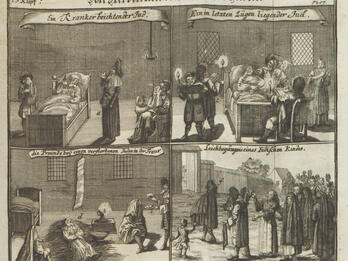Bine’ot deshe’ (In Green Pastures): On Visiting the Sick
Chapter 14
Whenever you go in to visit any sick person, whoever he may be, coerce him, even against his wishes, into making a will, and do not have any concern on account of his sons and his wife and the members of his family, that they might quarrel with you. Even more so, if you are one of the prominent individuals in the place where he lives, it is vital to stand resolutely against this dereliction of duty until such time as he makes his will, lest he may lose his business ledgers or the debts due to him, or his sons cause his inheritance to be lost and strife arises between his sons and his wife over his inheritance. And this constitutes a religious obligation for him: you should open up his business ledgers for him, and demonstrate to him how great his punishment will be should he fail to make his will, and that if he does make his will, behold, His reward is with Him, and His recompense before Him (Isaiah 40:10).
And whenever you hear, or see, a bier in your vicinity, do not curl up inside; rather, go out and escort [the deceased to his final resting place], and as a result of this, others will escort you too, in due course, as our rabbis of blessed memory have declared [b. Berakhot 18a]: “Anyone who sees a deceased person and fails to escort him [to the grave transgresses the verse he who mocks the poor blasphemes his Creator (Proverbs 17:5)].” And our sages of blessed memory further interpreted the verse You shall not eat with the blood (Leviticus 19:26) to mean “so long as the dead body is still lying upon the ground, it is forbidden to eat until he has been buried and left your immediate camp.” If you are able to accompany the bier until they have buried him in your land, how goodly is your portion, and you may then go to eat your bread with joy [see Ecclesiastes 9:7]. For there is a religious duty devolving upon you to visit the sick among you, and to bury your dead, and to comfort your mourners, and to make a wedding for your sons, as well as for the orphans among you, and to provide hospitality to guests and to escort the deceased among your nation [to the grave], as our rabbis of blessed memory have expounded, based upon the verses of your Torah.
And exercise care, my dear son, at the time when the bier is on its way to the grave, that you do not turn your face around to gaze behind you, as the Satan is to be found among the women who escort your bier, and you will imperil your soul, heaven forbid! And with regard to a religious obligation that has no one seeking to perform it, such as the burial of an unidentified corpse [found by the wayside], whom it is a religious obligation to bury, it is necessary for you to seize it as your own, in order that both you and your descendants may live (Deuteronomy 30:19).
Credits
Published in: The Posen Library of Jewish Culture and Civilization, vol. 5.





